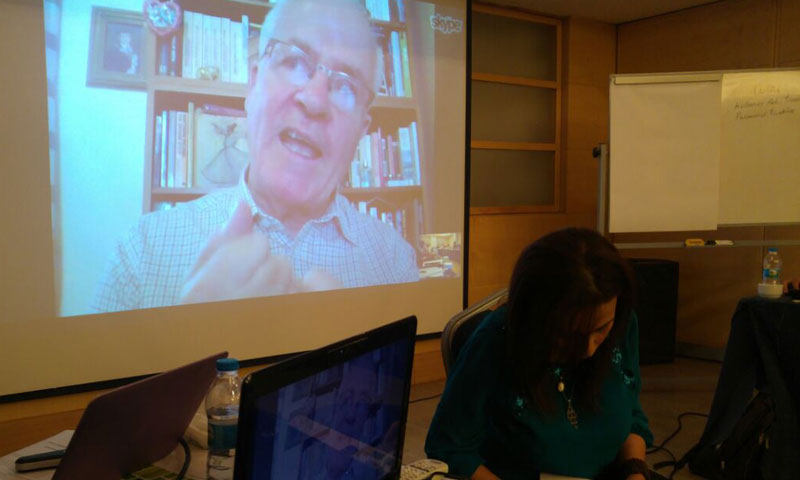



Yesterday, Sunday, July 23, the second meeting of the Syrian Media Development Program, organized by the “Ethical Charter for Syrian Media“, was held in Istanbul. It discusses the state of new media institutions and their employees.
During the whole day, the meeting dealt with the concept of violence in general; armed groups (whether governmental or non-governmental) and their relationship with the media; and the role journalists play when dealing with the conflicting parties in order to contain their negative impact on the public and reduce it by means of professional and ethical strategies that do not put their lives on the line.
The chairperson of the meeting sessions was the Egyptian journalist Abeer Al-Saadi who is specialized in covering hot spots in the Middle East and Africa. She has worked as a war correspondent and media consultant for over 25 years in Syria, Iraq, Egypt, Libya, Sudan, Yemen, Pakistan, and Thailand.
Enab Baladi participated in the meeting sessions together with more than 20 journalists who represent local television, radio, and newspaper media institutions. They discussed the Syrian experience, the violence that the war brought to the country, and how the conflicting parties used political propaganda to influence public sentiment and manipulate the opinions and decisions of the international community.
During the meeting, Journalist Saadi held Skype interviews with experts and journalists who have a wide experience of political and military hot spots around the globe, including British journalist Aidan White, Director of the Ethical Journalism Network, Australian journalist Lauren Williams of ABC News, Tunisian journalist Sadeq al-Hammami, a professor at the University of Manouba in Tunisia, and the Afghani journalist Najeeba al-Qailoubi, who has a renowned media experience in Afghanistan.
During his intervention, White answered one of the most important questions that usually come to the fore in times of conflict: “How can a journalist avoid falling into the trap of political propaganda in conflict zones?” He stressed the need to stick to five professional principles that ensure an ethical and impartial media coverage.
White outlined the principles in the following points:
This was the second meeting in a series of four meetings that are being organized by the Ethical Charter and whose targets are the administrative and editorial boards of the Syrian institutions. They aim at refining the Syrian media working methods and their editorial policies, hence contributing to their development and raising their professionalism.
The first meeting was held on July 2 and covered the concept of investigative journalism. It was chaired by American journalist Mark Lee Hunter, one of the world’s leading investigative journalists.
A few weeks ago, the Ethical Charter for Syrian Media has announced its Syrian Media Development Program to be launched. This program involves, in addition to expert meetings, workshops that are specialized in the media.
if you think the article contain wrong information or you have additional details Send Correction